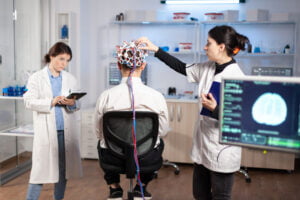Introduction to Artificial Intelligence in Healthcare
In recent years, the field of healthcare has witnessed a remarkable transformation with the integration of Artificial Intelligence (AI) technologies. AI, a branch of computer science that aims to simulate human intelligence, has proven to be a powerful tool in revolutionizing patient outcomes. From improving diagnostics and treatment to enhancing patient care and experience, AI has the potential to reshape the way healthcare is delivered. In this article, we will delve into the various applications of AI in healthcare and explore its impact on patient outcomes.
How AI is improving patient outcomes
The ability of AI to process and analyze vast amounts of data has paved the way for more accurate and timely diagnoses. By leveraging machine learning algorithms, AI systems can analyze medical images, such as X-rays and MRIs, with a level of precision that surpasses human capabilities.
This not only speeds up the diagnosis process but also reduces the risk of misinterpretation and allows for early detection of diseases.
Furthermore, AI has enabled personalized treatment plans by analyzing patient data and predicting the effectiveness of different treatment options. By considering a patient’s medical history, genetic makeup, and other relevant factors, AI algorithms can recommend the most suitable treatments, reducing the trial-and-error approach often seen in healthcare. This not only improves patient outcomes but also helps in optimizing healthcare resources.
Applications of AI in healthcare
AI have found applications in various areas of healthcare, ranging from diagnostics to research and beyond. One such application is in telemedicine, where AI-powered chatbots and virtual assistants can provide preliminary medical advice and triage patients based on their symptoms. This not only reduces the burden on healthcare providers but also ensures that patients receive timely care, especially in remote or underserved areas.
In addition, AI has also been instrumental in drug discovery and development. By analyzing vast amounts of biomedical data, AI algorithms can identify patterns and predict the efficacy and safety of potential drug candidates. This not only accelerates the drug discovery process but also improves the success rate of clinical trials, leading to faster access to life-saving medications.
AI-powered diagnostics and treatment
AI has transformed the field of diagnostics by enabling more accurate and efficient interpretation of medical images. By training AI algorithms on large datasets of medical images, such as CT scans and mammograms, these systems can detect anomalies and early signs of diseases with a level of accuracy that surpasses human radiologists.
Moreover, AI has also been instrumental in robotic surgery, where AI-powered robotic systems assist surgeons in performing complex procedures with precision and accuracy. By leveraging machine learning and computer vision, these systems can analyze real-time surgical data and provide surgeons with valuable insights and guidance, thereby improving surgical outcomes and reducing the risk of complications.
Enhancing patient care and experience with AI
In addition to diagnostics and treatment, AI has the potential to revolutionize patient care and experience. Virtual health assistants powered by AI can provide personalized reminders for medication, monitor vital signs, and offer guidance on healthy lifestyle choices. This not only empowers patients to take control of their health but also reduces the burden on healthcare providers.
Furthermore, AI-powered predictive analytics can help healthcare organizations identify high-risk patients and proactively manage their conditions. By analyzing patient data and identifying patterns, AI algorithms can predict the likelihood of disease progression or adverse events, allowing healthcare providers to intervene early and prevent complications. This not only improves patient outcomes but also reduces healthcare costs.
Ethical Considerations in AI Healthcare
While AI holds tremendous potential in healthcare, it also raises important ethical considerations. One such consideration is the privacy and security of patient data. As AI systems rely on vast amounts of patient data to train and improve their algorithms, it is crucial to ensure that patient privacy is protected and data breaches are prevented. Healthcare organizations must implement robust security measures and adhere to strict data protection regulations to safeguard patient information.
Another ethical concern is the potential bias in AI algorithms. If AI algorithms are trained on biased datasets, they may perpetuate existing healthcare disparities and inequalities. It is essential to address this issue by ensuring diversity and representativeness in the datasets used to train AI systems. Additionally, ongoing monitoring and auditing of AI algorithms are necessary to identify and correct any biases that may arise.
Challenges and limitations of AI in healthcare
While AI has the potential to revolutionize healthcare, it also faces challenges and limitations. One major challenge is the lack of standardized data formats and interoperability between different healthcare systems. To fully leverage the power of AI, healthcare organizations need to invest in robust data infrastructure and ensure seamless integration of data from various sources.
Moreover, the complexity and dynamic nature of healthcare makes it challenging to develop AI models that can adapt and generalize across different patient populations and settings. AI algorithms must be continuously validated and updated to ensure their accuracy and effectiveness in real-world healthcare scenarios.
Future trends in AI healthcare
The future of AI in healthcare holds tremendous promise. As technology continues to advance, we can expect AI to play an even greater role in personalized medicine. AI algorithms can analyze a patient’s genetic profile, environmental factors, and lifestyle choices to predict disease risk and recommend tailored prevention strategies. This not only empowers individuals to make informed decisions about their health but also enables healthcare providers to deliver targeted interventions.
Another emerging trend is the use of AI in mental health. AI-powered chatbots and virtual therapists can provide support and counseling to individuals facing mental health challenges. By leveraging natural language processing and sentiment analysis, these systems can offer personalized recommendations and interventions, bridging the gap between demand and access to mental healthcare.
Implementing AI in healthcare organizations
To harness the power of AI in healthcare, organizations need to develop a comprehensive strategy for implementation. This involves investing in AI infrastructure, training healthcare professionals in AI technologies, and fostering a culture of innovation and collaboration. Additionally, healthcare organizations must ensure compliance with regulatory requirements and ethical guidelines to build trust and confidence in AI systems.
Conclusion
Artificial Intelligence has the potential to revolutionize healthcare by enhancing patient outcomes and transforming the way healthcare is delivered. From improving diagnostics and treatment to enhancing patient care and experience, AI holds tremendous promise in improving the quality and efficiency of healthcare services. However, it is essential to address ethical considerations, overcome challenges, and invest in robust data infrastructure to fully leverage the power of AI in healthcare. By embracing AI technologies responsibly, we can usher in a new era of healthcare that is personalized, efficient, and patient-centered.












